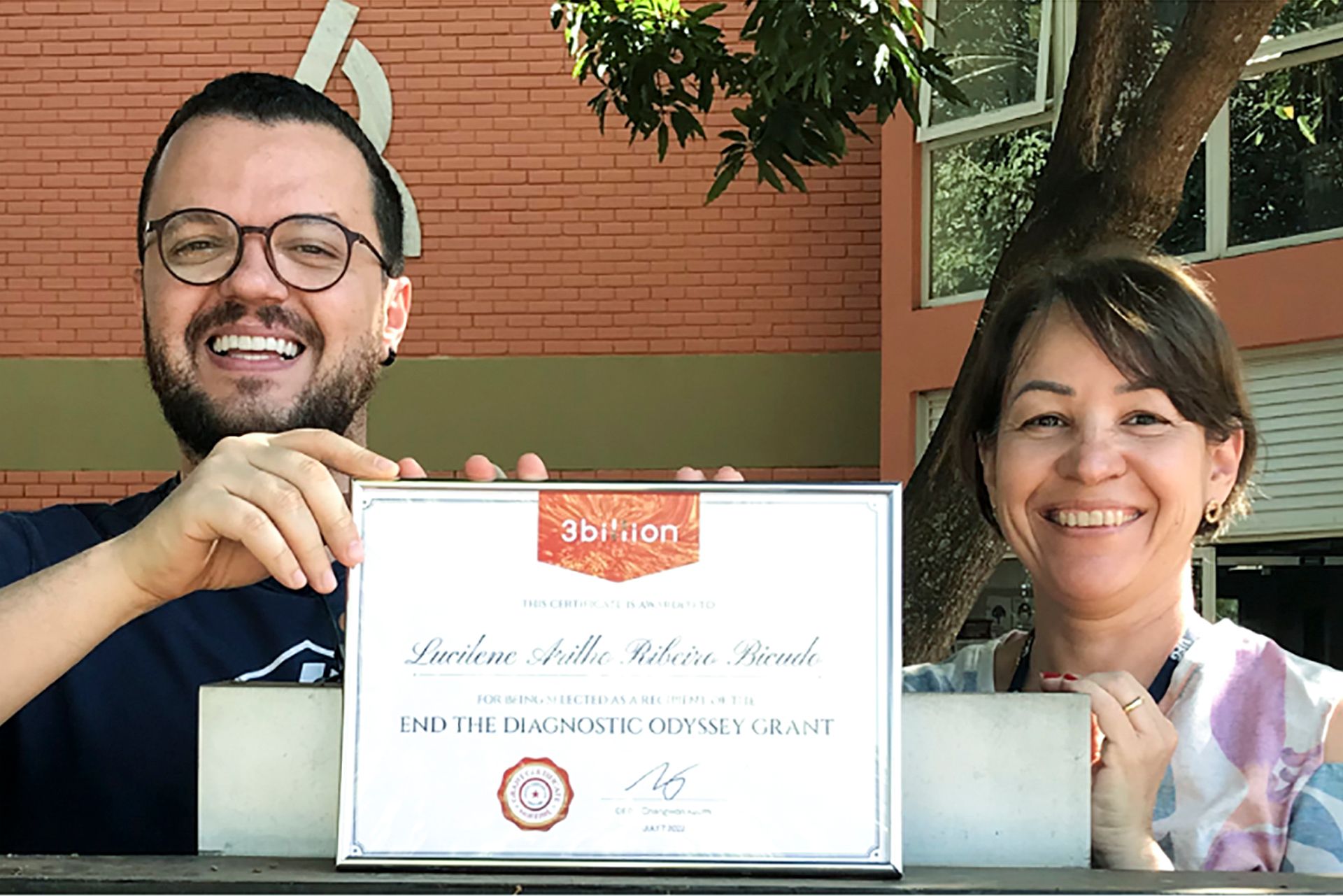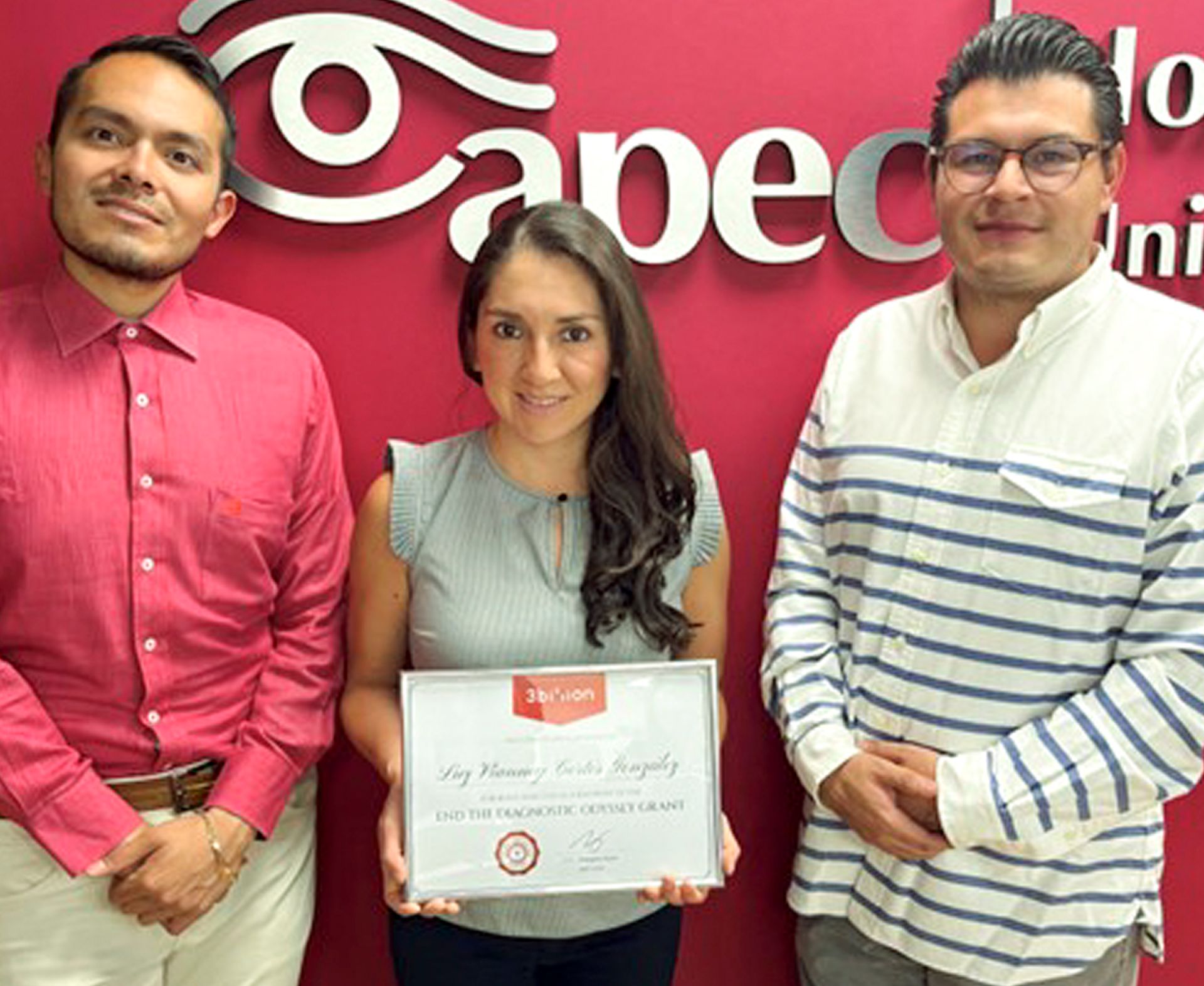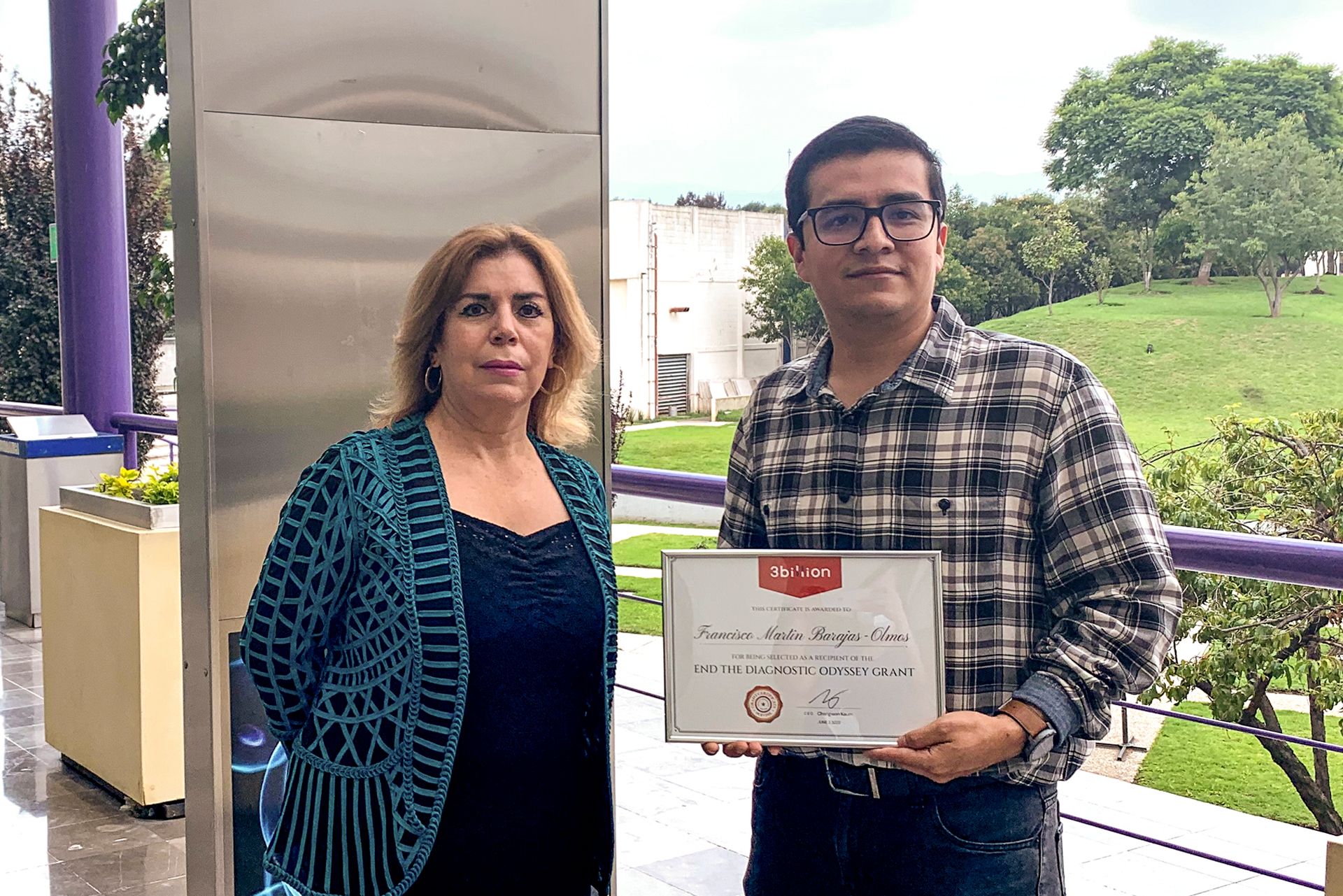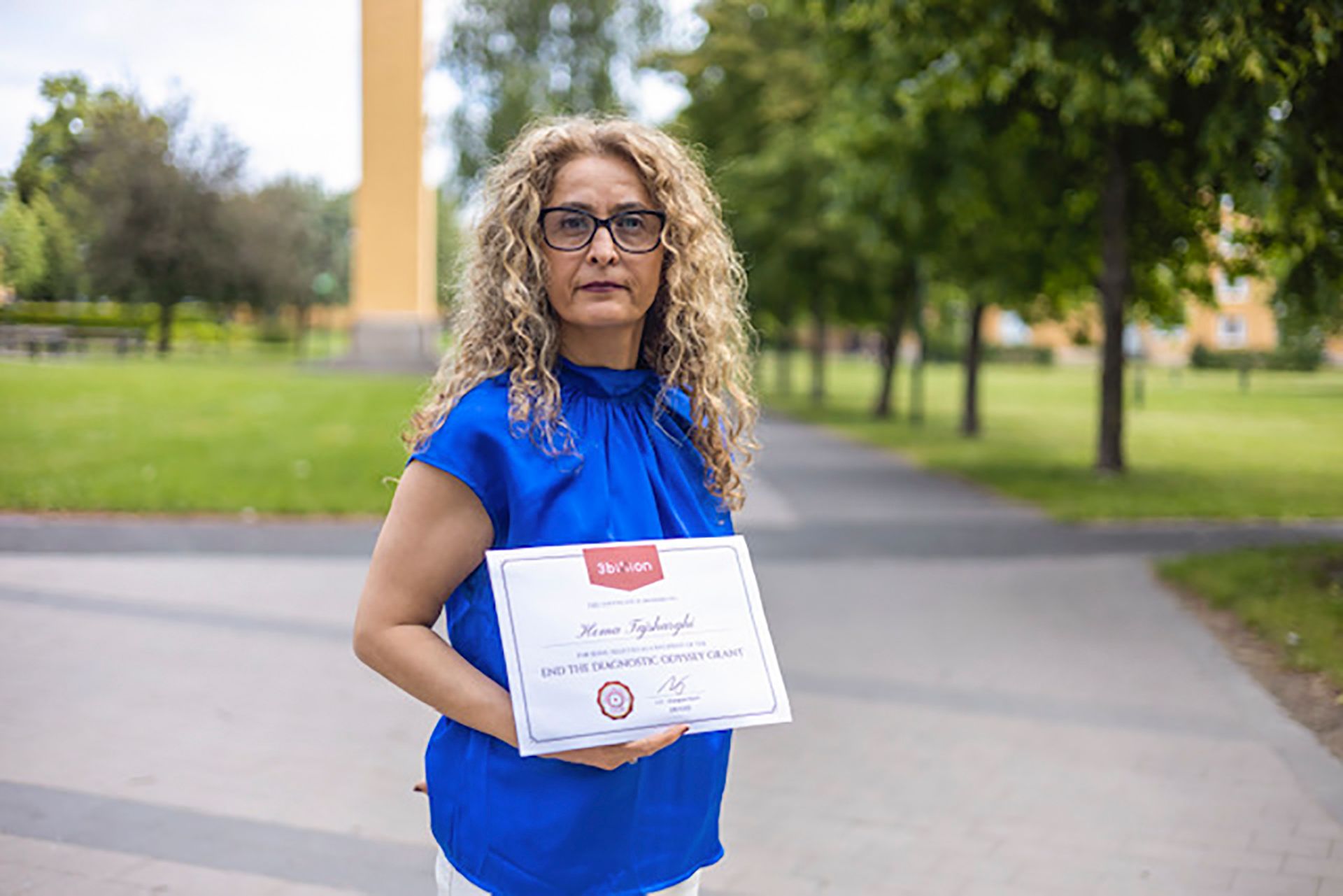3billion Announced the Winners of the 2nd End the Diagnostic Odyssey Grant
3billion recently once again opened up applications for the End the Diagnostic Odyssey Grant. We are once again excited to announce the physicians and researchers that were selected as winners. It is our hope that with this grant, they can help further the understanding of their respective field of research, and result in helping future generations that suffer from similar genetic diseases to reduce the diagnostic odyssey.
Dr. Lucilene Arilho R. Bicudo from the Instituto de Ciencias Biologicas(ICB) – UFG, Brazil

Dr. Lucilene Arilho R. Bicudo from the Departamento de Genetica graduated in Biological Sciences at UNESP, Botucatu Campus (1993), received a Master’s Degree in Genetics from UNESP, Campus de Botucatu (1996) and Ph.D. in Molecular Genetics at New York University, USA (2000).
From 2000 to 2014 she was a researcher at the Hospital for the Rehabilitation of Craniofacial Anomalies working on the investigation of genes associated with various rare conditions. Since 2015, she has been a researcher and professor at the Federal University of Goias (UFG), Postgraduate Program in Biological Sciences of the UFG and a collaborating professor of the IBB Graduate Program at Unesp, Botucatu.
Her primary areas of interest are in molecular genetics, focusing on the genetics of midline defects, intellectual deficiency and congenital heart diseases; genomics and syndromology; and mutation and developmental genes.
The research of Dr. Lucilene Arilho R. Bicudo alongside Nadia Aparecida Bergamo, Rosangela Hatori Rocha, and Elisangela Silveira Lacerda associated with this grant will look to sequence the genome of patients who have a rare disease of a genetic nature and listed in two of the three axes of rare diseases determined by the Ministry of Health: Congenital Anomalies, Late Manifestation or Intellectual Disability. All patients will consist of those that are still without a defined diagnosis. It is their aim, that with the results garnered that both the time of diagnosis will be reduced and the diagnostic yield will increase for future patients based on the results collected.
Dr. Lucilene said of the grant “Being selected for this Grant was a breath in my soul.”
Dr. Luz Vianney Cortés González from Asociación para Evitar la Ceguera en México I.A.P. Hospital “Dr. Luis Sánchez Bulnes,” Mexico

Dr. Luz Vianney Cortés González from the department of genetics of is a doctor in medicine with ten years of professional experience in inherited eye diseases. She has a Master’s degree in Genetics and Genomics at University of Barcelona. Also, she studied as a fellowship of Ophthalmic Genetics at Asociación para Evitar la Ceguera en México, with a specialty in Medical Genetics at the Instituto Nacional de Pediatría, both in Mexico. She is also part of the Pan American Inherited Retinal Disease Group (PANIRD). Her main clinical and research interests include genetic diseases that cause blindness or low vision such as: retinal dystrophies, congenital cataract, eye malformations, childhood glaucoma, and genetic syndromes in children and adults.
Dr. Luz Vianney Cortés González alongside David Alfonso Apam Garduño, MD. and
Miguel Rodríguez Morales’, MD, MSc. research will involve exome sequencing in patients with ocular anomalies and systemic manifestations with an unknown etiology.
She said of the grant “This will be crazy! It will allow the diagnosis of many patients and families who do not have access to these studies.”
Dr. Francisco Barajas-Olmos from the Immunoenomic and Metabolic Disease Laboratory of the National Institutue of Genomic Medicine, Mexico

Dr. Francisco Barajas-Olmos has been part of this laboratory for ten years. Led by Dr. Lorena Orozco, this laboratory has been working to increase Mexican ethnic diversity in genomic studies. This has been possible by including Latin American patients in health-related genetics studies in global consortia such as gnomAD and SIGMA.
For more than 25 years, the laboratory has focused on genomics of rare and multifactorial diseases oriented towards Precision Medicine. Now, using Next-Generation Sequencing as part of this grant, diagnosis will be enhanced in Mexican patients suspected of suffering from a rare disease that will lead to timely treatment.
Dr. Barajas reacted upon receiving the grant, “I am very excited to be a beneficiary of this grant, with which the whole exome sequencing will be possible in Mexican children with rare diseases, treated at the National Medical Centers to provide a certain diagnosis and accurate genetic counseling.”
Professor Homa Tajsharghi of the Division of Biomedicine, Translational Medicine (TRIM) of University of Skovde, School of Health Sciences of Sweden

Prof. Tajsharghi is a Professor in Biomedicine that completed her Ph.D. 2003 at the Sahlgrenska Academy, University of Gothenburg, Sweden. She has substantial experience in large-scale genomic data analysis and experimental pathobiology in human rare neurogenetic diseases. Her interest in using advanced genetic technologies for the discovery of rare disease genes led to the development of the collection of undiagnosed rare disease families, which are recruited in collaboration with clinical collaborators worldwide. From coordinating and collaborating on large-scale genome-wide analysis projects for a variety of inherited traits to the analysis of whole exome and whole genome data for rare disease diagnosis, her group has successfully identified and characterized many novel diseases of a previously unknown genetic causes for rare diseases. Her work has focused on revealing novel neurogenetic causes and understanding the pathobiology of the diseases and testing therapeutic approaches. Her methodology for research entails three parts: identifying new disease-causing genes and characterization of novel rare neurogenetic disorders; understanding the disease pathobiology; and development of new therapeutic targets.
Her focus of this project will be on the use of genomic data to determine the underlying genetic and molecular mechanisms of inherited traits, with the main focus on identifying and characterization of previously unknown neurogenetic rare diseases. This work will help families and patients to know the cause of their disease and to continue to work on finding new genes for neurogenetic diseases and to reveal which other yet-unknown genes are involved in the development of rare diseases.
Prof. Tajsharghi said after receiving the grant, “I am deeply honored to be selected for this grant. This is an incredible opportunity for my research team to focus even more on large-scale sequencing and hunting disease-causing genes involved in the development of rare neurogenetic disorders and to ultimately solve the diagnostic dilemma for families and patients.”
Get exclusive rare disease updates
from 3billion.

3billion Inc.
3billion is dedicated to creating a world where patients with rare diseases are not neglected in diagnosis and treatment.





